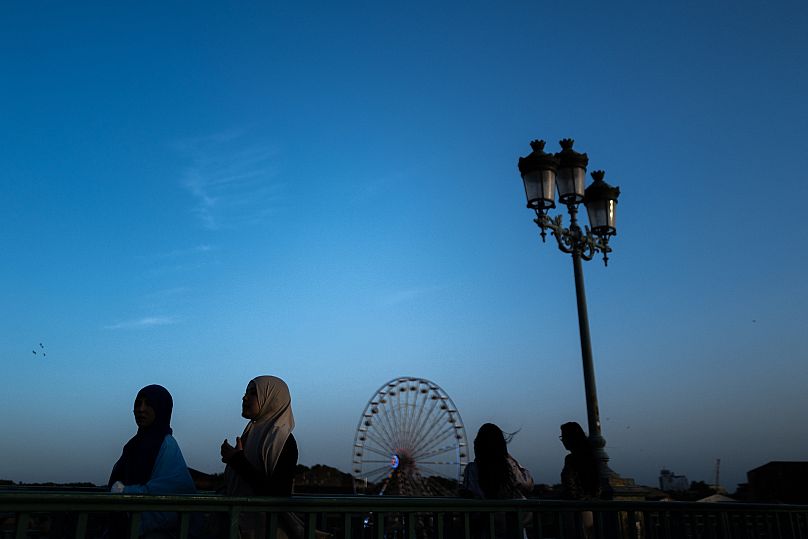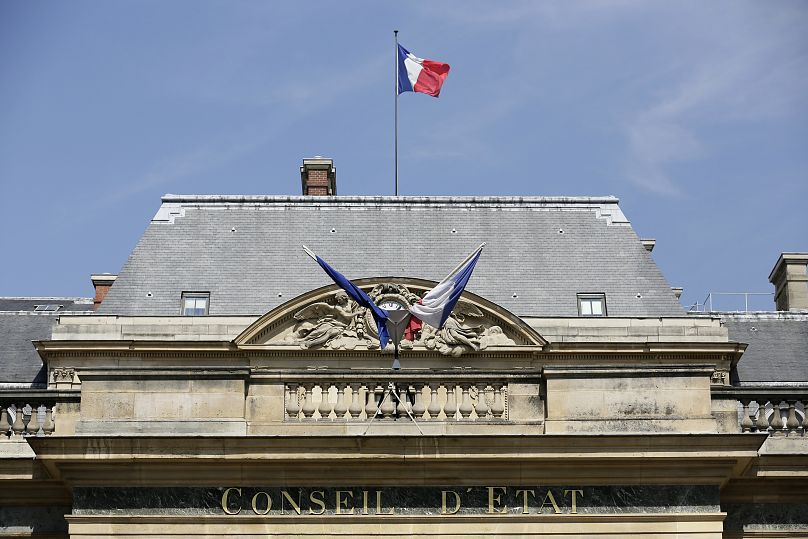Action for the Rights of Muslims had filed the motion with the State Council, seeking an injunction against the ban, claiming it was discriminatory and might incite hatred against the Muslim community.
The top administrative court in France has upheld a government ban on the wearing of the abaya in schools.
The Conseil d'État - or State Council - dismissed complaints that the ban was discriminatory and could potentially incite hatred.
The court, the country’s highest for complaints against public authorities, said late on Thursday that it had decided to reject a request for an injunction against the prohibition.
Ahead of the court’s ruling, France’s Council of the Muslim Faith had raised concerns that the banning of the abaya could create “an elevated risk of discrimination” against Muslims, both school pupils and older.
Action for the Rights of Muslims (ADM) had filed the motion with the State Council seeking an injunction against the veto, claiming it was discriminatory and could potentially incite hatred.
Staying true to the French law of secularism, a pillar of the Republic since 1905, the State Council found that wearing the garments “follows the logic of religious affirmation”.
Separation of religion and state is a core principle of French law and the abaya ban was upheld on that fact, which does not allow anyone wearing visible signs of any religious affiliation in schools.
The State Council refuted claims brought by the ADM that the outlawing of the abaya would cause: “serious or obviously illegal harm to the respect for personal lives, freedom of religion, the right to education, the wellbeing of children or the principle of non-discrimination”.
ADM’s lawyer, Vincent Brengarth, had argued during the court hearing that the abaya should be considered a traditional garment, not a religious one and accused the French government of using the ban to further its political aims.
Taking to social media after the Council’s decision, he condemned the move, writing: “A very unmotivated decision after a hearing of nearly two hours. This decision, which simply endorses the government’s position, is not up to the challenge”.
The State Council has previously overturned bans seen as discriminatory to those of the Muslim faith.
In 2016, they reversed a prohibition against the ‘burkini’ - a swimsuit which covers the whole body except the face, the hands and the feet - saying it was not a threat to public order.
More recently, though, the abaya ban has caused uproar from both sides of the political fence.
The abaya - a long, robe-like dress, has been prohibited in schools across the nation since last month.
In August, the French education minister, Gabriel Attal, put the prohibition in place, saying that the garment breached the "principle of secularism".
Since pupils went back to class on 4 September, dozens of girls have been sent home for refusing to remove their abayas.
While flouting the ban may anger some who think it’s a solid idea, psychology expert Bayu Prihandito tells Euronews that it could lead to an identity crisis.
“Adolescence is a critical period for building our identity. The abaya, for many, isn't just attire but a symbol of faith, culture, and personal choice”, Prihandito explains, adding, “Restricting its use can lead to an identity crisis, where students struggle with questions about who they are and where they can fit within the society”.
France has enforced vetoes on religious symbols in state schools since 2004, including forbidding headscarves in schools and full face veils in public.
Known as laïcité, it’s a strict brand of secularism and one which has proved divisive, regularly triggering political tension in the country. The more than five million-strong Muslim community have frequently spoken out against the decisions.
In order to enforce the abaya ban, Gabriel Attal has previously announced that 14,000 educational personnel would be trained by the end of this year, with that number rising to 300,000 by 2025.
The announcement was immediately contentious, with some seeing it as a welcome reminder of secularism, while others claimed it was nothing but a smokescreen intended to eclipse problems in the education department - or to fuel ‘Islamophobia’.
The debates raging around bans like that of the abaya have become increasingly tense since a wave of deadly Islamist attacks hit the country in the last decade.
"We live in our society with a minority, people who, hijacking a religion, come to challenge the Republic and secularism," President Emmanuel Macron said on Monday, commenting about the ban.
"We can't act as if there haven’t been terrorist attacks and [the case of] Samuel Paty," Macron continued, referring to the teacher murdered in 2020 by a radicalised young man of Chechen origin. Paty had allegedly shown caricatures of Muhammad in class as part of a lesson on freedom of expression.
According to a recent survey, reported on by AFP, some 81% of French people approve of the ban on the abaya in schools.
Bayu Prihandito tells Euronews that the ban could lead to social isolation and violence at worst.
“As humans, we are inherently social beings, and such isolation can be more damaging than it appears on the surface, leading to feelings of loneliness and, in extreme cases, depressive symptoms” Prihandito explains, adding, “Some might internalise the conflict, leading to suppressed emotions, while others might externalise it, resulting in violent behavioural issues”.
As well as psychological and behavioural issues about schoolchildren, there are also concerns that the ban, now written in law, will cause further waves among the wider Muslim community.
"When you ban the abaya in France, you give an excuse to Islamists to say: 'Look, we are discriminated against'. It will be said that French secularism is anti-Islamic. This will be criticised. This could be used to justify violence,” Pooyan Tamimi Arab, an Iranian researcher in religious studies at the University of Utrecht fears.
France is regularly described as "Islamophobic" in the Muslim world, with its frequent bans and controversial cartoons of the Prophet Muhammad published in the publication Charlie Hebdo often decried as going “too far”.













